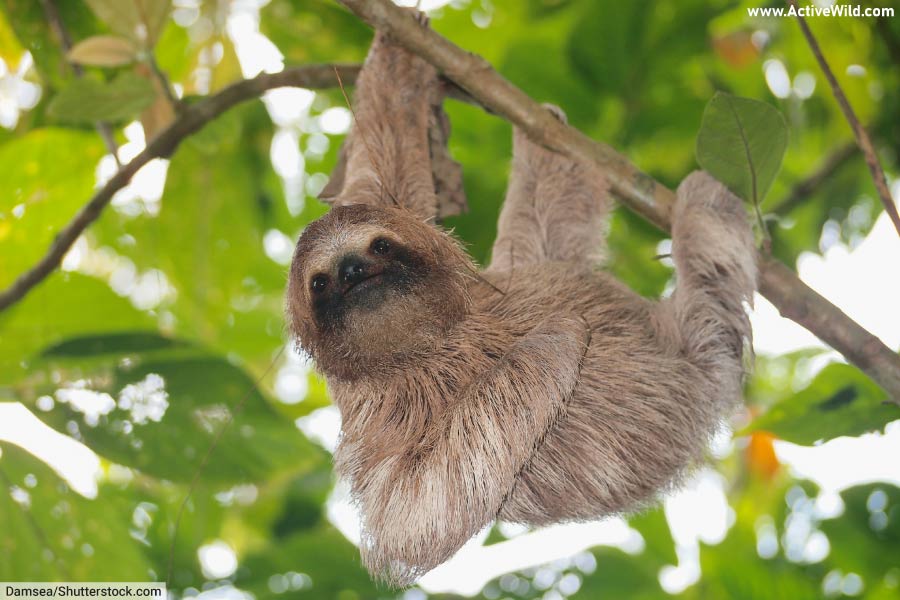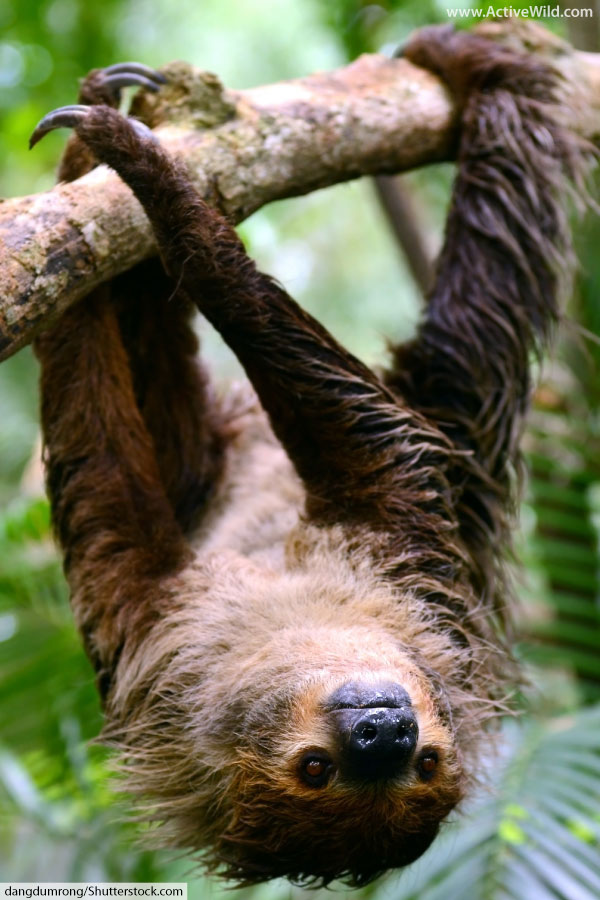[ad_1]
An entire information to the several types of sloths, with footage, species descriptions, and conservation data.
Completely different Sorts Of Sloths
There are six species of sloths; divided between two households: Bradypodidae, the three-toed sloths; and Choloepodidae, the two-toed sloths.
There are 4 three-toed sloth species: the brown-throated sloth, maned sloth, pale-throated sloth and pygmy three-toed sloth.
There are two two-toed sloth species: Hoffmann’s two-toed sloth and Linnaeus’s two-toed sloth.
New Sloth Species?
A seventh sloth species, the southern maned sloth (Bradypus crinitus), a species of three-toed sloth, was recognized in a paper revealed in 2022 (hyperlink).
On the time of writing (August 2023), nonetheless, the southern maned sloth is but to be included in both the Mammal Species of the World database (hyperlink) or the Catalogue of Life (hyperlink), each of which have been consulted within the writing of this text. Yow will discover out extra in regards to the species within the record beneath.
Use the index beneath to seek out data on a specific sort of sloth, or proceed scrolling to browse all species.
Web page Index
Completely different Sorts Of Sloths
Variations Between Three-Toed Sloths Vs Two-Toed Sloths
Sloth Species Record With Photos & Details
Uncover Extra With Energetic Wild
All About Sloths

Sloths are slow-moving mammals native to the tropical rainforests of Central and South America. These distinctive creatures are recognized for his or her leisurely tempo, spending most of their lives hanging upside-down from tree branches.
Sloths belong to the taxonomic households Bradypodidae (three-toed sloths) and Choloepodidae (two-toed sloths), each of that are a part of the order Pilosa, which can be house to anteaters – the closest kin of sloths within the animal kingdom. The six (or seven) species of sloth make up the suborder Folivora.
These tree-dwelling, rainforest animals have a definite look, with lengthy limbs, curved claws and flat faces. Their our bodies are tailored for a life spent in bushes — their sturdy, curved claws permit them to securely grasp tree branches, and their gradual metabolism helps preserve power of their low-nutrient eating regimen of leaves.
Sloths are solitary animals, usually coming collectively just for mating. Their gradual actions make them weak to predators, however their greenish-brown fur, which might host symbiotic algae, offers a type of camouflage, permitting them to mix in with the bushes. The algae additionally provides sloths a supplementary supply of vitamins.
Regardless of their seemingly laid-back demeanor, sloths play an important function of their ecosystems. They function a cell habitat for a variety of bugs and fungi and assist in spreading seeds by means of their fecal matter, selling forest progress.
Variations Between Three-Toed Sloths Vs Two-Toed Sloths

- Variety of Toes: As their names counsel, three-toed sloths have three toes on their forelimbs, whereas two-toed sloths have solely two. (All sloths have three toes on their hind limbs.)
- Households: Three-toed sloths belong to the household Bradypodidae, whereas two-toed sloths are family members Choloepodidae.
- Facial Options: Three-toed sloths usually have a extra outstanding ‘masks’ round their eyes in comparison with two-toed sloths.
- Weight loss plan: Whereas each are primarily herbivores, two-toed sloths have a extra assorted eating regimen, often consuming bugs, small reptiles, and birds. Three-toed sloths are extra strictly herbivorous, primarily feeding on leaves.
- Exercise Sample: Two-toed sloths are primarily nocturnal, whereas three-toed sloths are primarily diurnal (energetic through the day), however may be energetic at night time.
- Dimension & Look: Three-toed sloths are usually smaller and have a extra rounded head and face and longer tails. Two-toed sloths have longer hair and a extra elongated face, and their fore and hind limbs are extra equal in size.
- Motion: Two-toed sloths have a tendency to maneuver quicker than three-toed sloths.
Sloth Species Record With Photos & Details
Pygmy Three-Toed Sloth

Scientific Title: Bradypus pygmaeus
Household: Bradypodidae (Three-toed sloths)
Weight: Roughly 2.5-3.5 kg (5.5-7.7 lb)
The place Discovered: Completely on the Isla Escudo de Veraguas, off the coast of Panama
IUCN Conservation Standing: Critically Endangered
- Smallest sloth species.
- Completely discovered on the Isla Escudo de Veraguas.
- Fur can host symbiotic algae, offering a greenish tint for camouflage.
The pygmy three-toed sloth is the smallest sloth species. Its again is barely noticed and (like that of different sloth species) typically inexperienced in colour as a result of algae residing in its fur.
The species is discovered solely on the Isla Escudo de Veraguas, a small island off the coast of Panama. Right here it lives each within the forests of crimson mangrove bushes and within the dense tropical rainforests of the island’s inside.
Resulting from its restricted vary, the pygmy three-toed sloth is especially weak to threats, and its inhabitants is estimated to be lower than 500.
Maned Sloth

Scientific Title: Bradypus torquatus
Household: Bradypodidae (Three-toed sloths)
Weight: 4-4.5 kg (8.8-9.9 lb)
The place Discovered: Atlantic coastal rainforest in southeastern Brazil
IUCN Conservation Standing: Susceptible
- Distinguished mane of lengthy black hair, particularly seen on the again of males.
- Discovered solely within the Atlantic coastal rainforest of southeastern Brazil.
The Maned Sloth is a three-toed sloth discovered solely within the Atlantic coastal rainforest of southeastern Brazil. It Is current in three Brazilian states: Espírito Santo, Rio de Janeiro and Bahia.
The species is distinguished by the mane of lengthy black hair on its neck and shoulders, which is especially outstanding in males.
The lifespan of the maned sloth is thought to exceed twelve years within the wild.
Pale-Throated Sloth

Scientific Title: Bradypus tridactylus
Household: Bradypodidae (Three-toed sloths)
Weight: Roughly 3.5-4.5 kg (7.7-9.9 lb)
The place Discovered: Northern South America, together with elements of Guyana, Brazil, and Venezuela
IUCN Conservation Standing: Least Concern
- Distinct pale face and throat with a darker “masks” across the eyes.
- Primarily dwells within the higher cover of tropical rainforests.
The pale-throated sloth is a species of three-toed sloth discovered within the tropical forests of northern South America. It’s current in areas of Guyana, French Guiana, Suriname, Brazil, and Venezuela. It isn’t discovered south of the Amazon River.
As its title suggests, the pale-throated sloth is characterised by a pale face and throat, contrasting with a darker “masks” round its eyes. People of each sexes are darkish gray with darker patches; males will be recognized by an orange or yellow patch on the again, which is split by a black stripe.
Brown-Throated Sloth

Scientific Title: Bradypus variegatus
Household: Bradypodidae (Three-toed sloths)
Weight: Roughly 4-4.6 kg (8.8-10.1 lb)
The place Discovered: Ranges from Honduras in Central America to northern Argentina in South America
IUCN Conservation Standing: Least Concern
- Recognizable brown-colored throat.
- Most widespread and adaptable of the three-toed sloths.
- Fur coloration can fluctuate considerably based mostly on location and age.
The brown-throated three-toed sloth is essentially the most widespread and customary species of three-toed sloth, inhabiting a variety that spans from Honduras in Central America to northern Argentina in South America.
As indicated by its title, the brown-throated three-toed sloth has a brown-colored throat, with fur that may fluctuate in shade from grey to brown based mostly on location and age.
Though rated as ‘Least Concern’ by the IUCN, the brown-throated three-toed sloth’s inhabitants is regarded as reducing, with threats together with deforestation and looking by native individuals.
Southern Maned Sloth
No picture out there
Scientific Title: Bradypus crinitus
Household: Bradypodidae
Weight: Roughly 4-4.5 kg (8.8-9.9 lb)
The place Discovered: Atlantic coastal rainforest in southeastern Brazil, significantly within the states of Espírito Santo and Rio de Janeiro.
IUCN Conservation Standing: Uncategorized
- Solely not too long ago recognized as a separate species to the maned sloth
- Head resembles a coconut!
The southern maned sloth was first found in 1850 by English zoologist John Edward Grey, though the species was not acknowledged by the broader scientific neighborhood, who thought-about it to be a maned sloth.
A current paper (Hyperlink) *** proposes that the southern maned sloth must be handled as a separate species on the idea of DNA evaluation and subject observations.
The southern maned sloth has a flatter cranium, extra rounded jaw and wider cheekbones than its northern cousin. Its head is described as resembling a “coconut”.
The species is discovered within the Atlantic Forest of Brazil, and is current within the states of Espírito Santo and Rio de Janeiro.
Linnaeus’s Two-Toed Sloth

Scientific Title: Choloepus didactylus
Household: Choloepodidae (Two-toed sloths)
Weight: Roughly 4-6 kg (8.8-13.2 lb)
The place Discovered: All through the Amazon Basin in northern South America
IUCN Conservation Standing: Least Concern
- Nocturnal in nature.
- Extra assorted eating regimen than three-toed counterparts, together with fruits and sometimes small prey.
Linnaeus’ two-toed sloth is present in South American rainforests north of the Amazon River. It’s also often known as “Linné’s Two-toed Sloth”. The species has an elongated face and lengthy shaggy, pale brown fur.
This nocturnal sloth species has a eating regimen extra assorted than that of three-toed sloths; in addition to leaves, it additionally eats a wide range of different plant materials comparable to shoots and fruit, and also will prey on small vertebrates.
Hoffmann’s Two-Toed Sloth

Scientific Title: Choloepus hoffmanni
Household: Choloepodidae (Two-toed sloths)
Weight: 4-5 kg (8.8-11 lb)
The place Discovered: Vary spans from Nicaragua in Central America right down to Peru and Brazil in South America
IUCN Conservation Standing: Least Concern
- Comparable look to Linnaeus’s two-toed sloth however with slight variations in distribution and habitat preferences.
- Primarily nocturnal.
- Will be present in varied habitats, together with rainforests, cloud forests, and mangroves.
Hoffmann’s two-toed sloth is a nocturnal sloth species discovered within the canopies of Central and South American rainforests. Characterised by its two claws on every forelimb, lengthy shaggy fur, and an elongated face, this species is among the many largest of the extant sloths.
Adaptable to completely different habitats, Hoffmann’s two-toed sloth will be present in rainforests, cloud forests, and even dry forests. Its eating regimen is assorted, together with leaves, fruits, and sometimes small prey.
Uncover Extra With Energetic Wild
Yow will discover out extra about sloths on this web page: Sloth Details
You possibly can see extra rainforest animals on this web page: Rainforest Animals Record with Photos & Details
You possibly can see extra South American animals on this web page: South American Animals
Go to our foremost animals web page for hyperlinks to animal data and an entire information to the animal kingdom: Animals
[ad_2]

